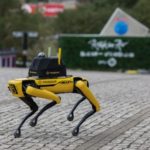Intel has announced plans to spin off its RealSense depth camera business as a standalone company in the first half of 2025. The new entity will remain within Intel’s Capital portfolio while maintaining its existing product lineup, roadmap, and customer support infrastructure.
The RealSense division, which originated from Intel’s Perceptual Computing division in 2013 and was rebranded in 2014, develops AI-driven computer vision devices including depth cameras, biometric tools, robotics solutions, and healthcare metrics. The technology has become particularly notable in the biometrics space following the 2021 launch of RealSense ID, a facial recognition camera module that processes biometric data directly on-device to enhance security and privacy.
In the robotics sector, companies like ANYbotics have integrated RealSense D435 modules into their quadruped robots for mapping and navigation. These depth-sensing capabilities have proven essential for autonomous navigation and environmental perception in both industrial and commercial applications.
The spin-off represents a strategic shift intended to enhance RealSense’s growth potential by enabling more flexible operations and swifter responses to market demands. The new company will be led by CEO Nadav Orbach, currently VP and GM Incubation & Disruptive Innovation at Intel, with RealSense founder Mark Yahiro handling business development.
The independent entity plans to expand into stereo vision, robotics, and AI software and hardware. With approximately 100 employees, most based in Israel, the company builds upon Intel’s previous acquisitions of Israeli startups Omek Interactive and Invision Biometrics. This concentration of expertise in Israel has helped establish the region as a hub for computer vision and biometric technology development.
This development follows earlier restructuring efforts. In August 2021, Intel had initially announced plans to shut down the RealSense division but later opted to maintain operations with a reduced product lineup. The division’s survival and subsequent spin-off reflect growing market demand for advanced computer vision solutions, particularly in sectors like robotics, autonomous systems, and secure authentication.
Sources: Heise, The Robot Report
–
January 15, 2025 – by the ID Tech Editorial Team








Follow Us